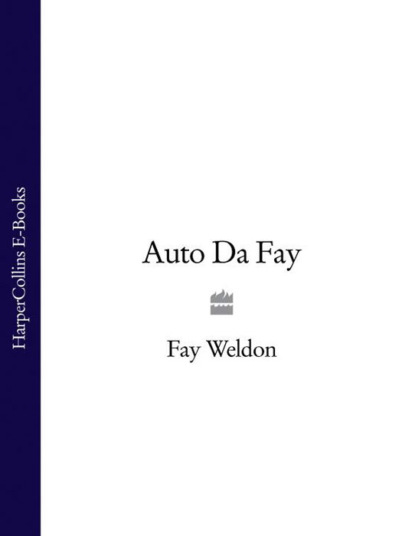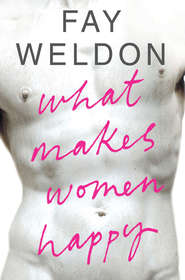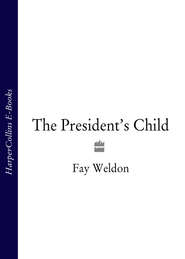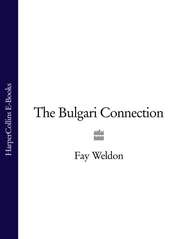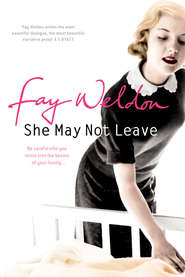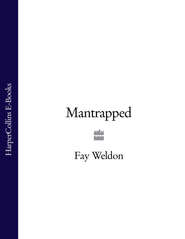По всем вопросам обращайтесь на: info@litportal.ru
(©) 2003-2024.
✖
Auto Da Fay
Настройки чтения
Размер шрифта
Высота строк
Поля
After the war, my mother said to me, when she thought once again of aspiring to be a ‘proper’ writer, styles of writing had changed. Novels ceased to be discursive, writers could not hide behind their anonymity; politics and social comment began to enter in. The novel was becoming a confessional, and readers demanded that the writer speak the truth as he or she knew it, and my mother’s truths were difficult enough to live through, she said, let alone writing about them as well.
Margaret, Jane’nFay (#ulink_5367514a-3e48-5bc3-9378-50354569a44d)
There were various to-ings and fro-ings between my parents and then it was Frank’s turn to walk off into the mist. This was a literal mist, more than just the usual cloud of childhood unknowing. I was growing up. I was six. We stood upon a beach on a rainy day, my father, my mother, Jane and I, and my father walked off along the shore without us, saying, ‘Don’t ever leave the children with friends. Have them properly adopted.’ And then the mist swallowed him up; the tall, dark, consoling figure faded away, without so much as a glance behind. My mother was crying, which is not surprising. He was divorcing her for infidelity. She had only thirty pounds in the world, we had nowhere to live, and my father had gone to catch a ship to England, ‘home’, which was due to leave within the hour. Once the gangplank was up he changed his mind but it was too late then.
Matters had come to a head between them. To demonstrate to him just how upsetting she found his persistent adultery she had spent a night with a passing stranger, and told him that she had. But instead of showing remorse for his own behaviour he had been outraged by hers, and had started divorce proceedings within the hour. It was different for a man than a woman, as common wisdom had it then. Even now women will do this kind of thing, believing tit for tat will somehow cure matters but of course it never does. I have never known a confession of infidelity work anything but harm. The couple who ‘tell the truth to each other’ after their first visit to the marriage-guidance counsellor seldom enjoy many more nights together.
My mother left us with friends, naturally, while she found us somewhere to live. This was to be two rooms in a boarding-house in Cranmer Square. Jane and I no longer went to St Margaret’s across the way: it was a private school, there was no money to pay the fees. My mother, unlike my father, as she pointed out, would not spend money she didn’t have. The green uniforms were sold. The rest of our clothes were brought round in a small suitcase from the luxury of the private hotel. We were to go to a state school, St Mary’s Convent, to be taught by nuns. They would teach us manners, said my mother: we had been running wild. They would be very religious, but we were to take no notice of that.
The boarding-house was shabby and basic. There were no shiny green quilts upon the beds to hate, or round Chinese rugs to spoil. Now they were gone we missed them. The landlady was a harridan who wore curlers in her hair, did not like children, and had only taken us in out of pity. My mother was in disgrace, her name linked in the newspapers with a named co-respondent: guilty party in the divorce. She had not fought her corner: she did not have the money to do so, or the will. (My father was required to send us a meagre sum for our maintenance every month, but it was often late, if it came at all.)
The worst thing about the boarding-house was the magpie which guarded the backyard. It lived in a kennel like a dog, its wings were clipped, and it had a long rattling chain attached to its scrawny leg. When you opened the back gate it would run at you to peck your ankles, screeching ‘Go on out, go on out!’ in a flurry of black and white raised wings and gaping orange mouth. It was what the landlady would shriek as she swept the atrocious bird from her path with the garden broom, the flesh of her ankles falling in folds over her shoes: the bird had learned the phrase from her and now mimicked it to its own ends. I had no broom with which to defend myself: I would try to sneak in the front door in Cranmer Square, but this was forbidden to children, who must use the back yard and face the bird. My ankles were covered in peck marks and sometimes even bled, but I didn’t complain: my mother had enough to be getting on with, so much was obvious, and would get us out of there as soon as she could.
I was so closely aligned to Jane that I had no vision of her as a separate being. She did not count as a sister, as a companion, rather she was an extension of me, and my mother soon became the same. We went round in a survival unit of three: Margaret, Jane’nFay.
My mother decided to paint wooden powder boxes for a living. Pretty women bought face-powder by the ounce, and transferred it to a decorated round box upon their dressingtable, and placed a powder puff on top of it, and a lid on top of that. It needed to look feminine. She would do the decorating. Alas, the pretty women did not want painted powder boxes in sufficient number for us to make any kind of a living: powder was for special occasions only. It lay on the top of the face in a floury film; Max Factor pancake foundation had not yet been invented. The limit of my mother’s skin care was a pot of Pond’s cold cream, to be applied at night.
I still have one of the powder boxes we failed to sell: pale glazed wood, with stylized flowers painted elegantly upon its lid. My mother’s training at the Slade School of Art was paying off, though not perhaps in the way her tutors had envisaged. I love it and hate it, and as for using it, that’s out of the question. Powder flies all over the room. I keep buttons in it, on the theory that one day or another I shall take up a needle and sew.
Letters came from my father. He made a book for us out of firm paper, and glued photographs and drawings to it, and scraps of poetry, and tales of things he had done and seen, and people he had met. He had taken a lot of time over it: I thought perhaps he missed us. I assumed he would be back soon and we would all live together again. (No one had mentioned the divorce.) He seemed to be quite rich: he sent a photograph of himself leaning against a KLM aircraft, in Amsterdam. He sent a book, Ferdinand the Bull. Ferdinand was stung by a bee and picked for the bullring because of it. When it came to the point he just sat down and smelled the flowers in the ladies’ hats and lived happily ever after. A good pacifist book: even my mother admired it. My father was going back to school in London to get some more medical letters after his name. Yes, said my mother, your father always has money to do what he wants. But he’s a very good doctor, never forget that.
I looked for Holland on the map. I could accept by now that the world was round. Europe took precedence in the scheme of things. They were on top, we were underneath. If anyone were to fall off it would be us.
I learned anxiety and fear. I was out playing sevens in Cranmer Square – you threw a tennis ball against a wall and caught it in a progressively difficult way – so many bounces, overarm, underarm, a group of seven to be completed before you could move on to the next stage; as solitary and obsessive an occupation as any computer game today – when I was interrupted by a boy. I didn’t know him. My concentration went: I dropped the ball and complained. He told me he had been in an earthquake, and how the earth yawned in front of you and if you weren’t careful you fell down into the cracks, and even as you scrabbled to climb out the earth would close again, and squash you. It had happened to a friend of his. He told me about how erupting volcanoes could suddenly rise up out the ground, and how the boiling lava would frizzle you alive, and he hoped it would happen to me. If you felt the earth shake beneath your feet it meant earthquake or volcano was about to happen. Then he walked off. I was petrified. Every now and then I did feel the earth shake but I was never sure if it was in my head or outside. How would one know? You could look to see if the ceiling light was swaying, and sometimes it was, but your eyes must be deceiving you, because everyone said there were no earthquakes in the South Island, only in the North, and all the volcanoes were extinct.
I don’t know whether Jane shared my fear: I assumed she did, but I may have been wrong. We were separate enough for her to love St Mary’s Convent and me to hate it. The nuns liked her and were suspicious of me. Jane was good and quiet and looked holy: I was noisy and giggly and looked frivolous.
Convent Girl (#ulink_80695f9f-55e4-520a-a3b0-1aef78724da9)
The Convent was a tall building with gothic towers. Behind barred windows lived scores of women who wore black robes and white wimples. When they were angry, which they often were, they were like the magpie; they’d come screeching at you in a flurry of black and white, though rapping your knuckles or pinching you instead of pecking your ankles, and much more painfully. Fortunately most of them stayed in their cells in the towers: just a handful came out to teach in the school wing. Mother Teresa was nice and motherly, and would hug you and give you sticky sweets: all the others, from Sister Katherine to Sister Dorothy, ruled by sarcasm and violence. I liked their names, but that was about all.
The children, all Catholic except for a handful of heathen, which group included Jane and I, were on the whole cowed and snivelly. Their noses tended to run. I was a worse case of pious dereliction than Jane, who had at least been christened, albeit as a Protestant not a Catholic, but I had not even been that. My parents were freethinkers, rationalists, humanists – which was why I was spared Arthur Machen’s blessing. Jane was allowed to stay in the classroom while the rest of the class said their prayers and told their rosaries – some six times a day – but I had to leave the room, and stand outside the door with my spelling book, and learn the hard words. I became very good at spelling. I did not mind the exclusion much: prayers were boring and rosaries were peculiar, but I could see it was more comfortable to belong. But belonging was already beginning to seem unlikely. I was a homie, I spoke with a fancy accent, lived in a boarding-house and not a bungalow, didn’t get pocket money, and my mother put on airs. I was the youngest in my class by more than a year. I struggled to keep up.
The nuns decided that I had to be baptized. Otherwise, being unchristened, my fate was to go to limbo when I died. Limbo was the place, in their rather primitive theology, where all those born after Jesus’s time but who weren’t Catholics were doomed to go. It was a flat, featureless, grey landscape where nothing ever happened. The face of the Lord had been turned away. In retrospect it seems a fair description of a depression, and perhaps that’s all depression is, limbo leaked over in life: but the prospect certainly terrified me. There was no getting out of it: limbo was everlasting, and my certain fate, so I had better start learning my catechism and sign up for baptism now.
I asked my mother if I could be christened as a Catholic but she said certainly not. She did not seem to realize the full implications of what she had said or what she was letting me in for. I could see that the only way I would ever be able to save myself was if she were dead – but that would be bad for her because she would be going to purgatory, and I was ashamed of myself for wishing it. Purgatory was where she and Jane were going: they had been christened but didn’t go to Mass, so they would be put into this kind of holding pen for heaven and tortured there until they were purified. If people prayed for you after you were dead you could sometimes get out early. Then the gates of heaven would open and you would spend your time praising God.
I told them at school I wasn’t allowed to be a Catholic and they were shocked at a mother who would condemn her own daughter to limbo. It was probably a mortal sin. If you committed a mortal sin you went to hell. I could see the only thing to do was to stay alive, and when my mother died of old age, I would be free to be a Catholic.
I sat next to an etching of St Anthony being tortured in hell by demons, and tried to concentrate on mental arithmetic, and pronouns. I could not get the knack of the latter, so in a test I copied the answers of the girl in front of me, taking care to change one so as not to be charged with the sin. That was the only one I got right. I realized the imprudence of copying. Better to rely on yourself than others. I had my knuckles rapped for doing so badly in the test. A nun seized your hand, turned it over and banged your knuckles sharply against the desk. For some reason the girl I had copied from did not get her knuckles rapped, but then she was a devout girl who even at the age of seven wanted to be a nun. Knucklerapping hurt: anything to get out of it, but I did not want to join the magpies in their high tower, or even promise to. How they lied and swore and cheated, all the little convent girls, to get out of trouble or make money. I had never known anything like it.
My friend Colleen borrowed twopence from the newsagent telling him her father had just died. Then she went into the butcher and borrowed threepence saying she had to take it back to her father or he’d beat her terribly. Then she went to the newsagent and spent the lot on colour balls which she shared with me. I thought I ought to refuse but the sweets changed colour as you rolled them round in your mouth and I couldn’t resist. You had to keep taking them out of your mouth to see whether the pink had turned to violet, the magenta to mauve. It was a sticky process and the dye stayed round your mouth for days.
I was hungry most of the time. The boarding-house breakfast was meagre and my mother gave Jane and me sixpence between us to buy lunch every day. You could have a small hot meat pie or a cold apple pie or half a pound of broken biscuits from the biscuit factory down the road. The meat pie was nicest but it was also smallest. The biscuits were dry and dusty and hard to swallow. Drink came from the water tap.
There was a girl in my class called Beverley whom everyone hated. She had cross-eyes and spots, and was smelly. She crouched in a corner and whimpered, and the more they bullied the more bulliable she became. I thought it was outrageous. I played with her on principle: if I played with her the others would. I made her wash out her knickers. If her mother didn’t she’d have to do it herself. She cheered up a bit. Presently the other children asked to join in: Colleen, Mary, Teresa, Marjorie, all the big wild popular girls.
The nuns were firm creationists: I was taught that the world began with the Garden of Eden and Adam and Eve. I was annoyed to discover that Eve was created out of Adam’s rib as an afterthought, because God thought Adam needed company, and puzzled as to how Cain and Abel managed to have children without marrying their own sisters, which I knew was forbidden. My mother said that Genesis was not necessarily the only truth, but I knew her witness was not sound.
I took to reading the psalms in bed at night under the bedclothes. The nuns did not encourage us to read the Bible: on the contrary, they thought it should be mediated through a priest. It has always been my impulse to read what I am not meant to read and not to read what I am encouraged to. I fell in love with language, in what I can now see was in itself a kind of sub-erotic experience. I wrestled with the notion of the hills lifting themselves up and the valleys being exalted, and like Daniel wrestling with the lion, I won. If I could not understand, I osmosed. I do not think the Good News Bible could ever have done as well as this little, leather-bound, thin-papered Authorised Version we happened to have in the house. I wrestled with Ecclesiastes and the Book of Job, and came to the conclusion that the nuns were only telling half the story.
What the nuns gave us to read was Little Lives of All the Saints, a Victorian tract describing the tortures that young women of long ago endured preserving their virtue in the name of Jesus. Their breasts were chopped off, bits of them sliced up and fried, but they would not give up their virginity. They were beautiful and they were good, and pain was their reward. I was fascinated and horrified: I knew there was something wrong in my response but not quite what. Tremors, halfway between pain and pleasure, affected me as I read. Sex was a mystery to me, let alone the finer pleasures of masochism. I had no idea what virginity was, or what men did, or how babies were conceived. No one talked about these things at the convent for fear of knuckle-rapping or ear-tweaking: nuns slid about the corridors overhearing what was said, invisible until suddenly you saw them. All you knew about sex was that it was exciting and forbidden, and very secret.
On the way home from school one day a little boy with no clothes on ran out of his house. When I got home I asked my mother if there was something wrong with him, since he had this little bit hanging out in front. She said no but was too embarrassed to elaborate. I thought he was probably malformed.
Sin and Guilt (#ulink_f7910abd-a21e-5e33-b1a5-5a3ae85dac49)
The main problem with the convent was that you never knew what would get you into trouble. It seemed to have so little to do with common sense. It shrieked at you out of a clear sky. If your mother made you meat sandwiches on a Friday there was terrible trouble, though it was not your fault. You would be lining up at playtime to go back into the classroom, jostling as ever, called into silence. ‘You are touching one another. Never, never touch another person if you can possibly help it!’ I stretched out my hand and touched the person in front of me, in defiance. I was seen. Deliberate disobedience! My punishment was the worst they could think of: I was not to be allowed to stand and clap and wave flags when the cardinal from Rome came to bless us, dressed in his scarlet robes with gold binding. I was to stay in and learn more spelling. I learned to spell ‘theatre’, I remember, though my mother had to explain to me what it was. I didn’t mind at all not seeing the cardinal, which merely proved to the nuns how hardened in sin I was. But things were getting worse: I could not explain it: limbo was creeping round the outskirts, with occasional glimpses of hell showing through.
The nuns liked Jane and she liked them. She was quiet and clever and good at art and never got her ears tweaked. She embroidered exquisite flowers and made a little cloth book to contain them: it had a white vellum cover, on which she painted bluebells: it seemed something out of the past, from long ago. If I tried to do anything like that it got covered with ink and was tatty within minutes. Jane also painted an entire set of the Tarot pack: small, fine, perfect replicas of those sinister cards. I don’t suppose she did this in the school art class, and where she got the originals or whose idea it was I do not know. My mother half admired them and half hated them. I thought they were very spooky, especially the one she did of the Tower, the edifice splitting apart beneath the black hammer blow of a bolt of lightning.
A nun slammed open a window in the gothic tower of the convent as I ran up and down shrieking and splashing in the mud and called out to the world that I was a wicked girl and a heathen and the ringleader, and she would let my form teacher know in the morning. I spent a night of terror so abject nothing has been as bad since, not even the night in the haunted house in Saffron Walden years later. Nameless horrors, scrabbling to get in, the worse for being un-named. In the morning nothing happened. There was no hammer blow. I did not tell my mother because her life was hard enough.
I got a bad sore throat and lay with my pecked ankles in bed and couldn’t go to school and was tremendously happy. The doctor came and said I might have scarlet fever and if so I would have to go to an isolation hospital. I prayed to God that I could go, and to the Cardinal in his wonderful sweeping scarlet gown, all the way from Rome, the Holy City, to intercede for me with God. My prayers were answered, which was gratifying. I had begun to doubt the deity. I thought it said in the Bible that if you threw your bread upon the water it would be returned threefold: I’d throw some of the stale biscuits into the Avon but nothing ever came back, though rather more ducks than usual would come by. The ducks seemed so happy and free, though sometimes they too would turn on one of their number, a Beverley duck, as it were, and peck it to bits.
I loved the fever hospital. The nurses were kind and the other children were friendly. My ankles healed and fears of limbo receded. My confidence in the deity was restored. Invalid food, the like of which is not known in today’s hospitals or sick-rooms, food to tempt the reluctant appetite, was cooked and served. A little pale and white, it’s true – clear beef broth, steamed fish and mashed potatoes, and vanilla blancmange – followed by hot sweet milk and white-iced biscuits – but every spoonful you got down you was applauded.
Anything parents brought in had to be sterilized in great steam cupboards, and if they visited us, which they were only allowed to do once a week, they had to sit the other side of a thick glass partition. I had a fit of neurosis which I remember to this day: a girl in the bed opposite had a bag of sweets: she threw me one and missed and it went under the bed, but I chose to believe she had not thrown it, and had treated me badly, and wept and wept until a nurse came to comfort me. I knew perfectly well it was an accident but preferred to be miserable, for the sheer drama of it. Later in life I would treat lovers and husbands in this way. Taking offence and suffering because of it, knowing in your heart they are not in the least to blame, you just want a drama, and your turn at being a victim.
One day unannounced, it was not my mother sitting the other side of the glass screen when I was led in for the family visit, but my father. At least that was what the nurse said he was, and I had no reason to mistrust the nurse. I didn’t know what to say to him. He seemed tall and handsome and I was immensely flattered that he had come to see me, and to think that I was his daughter, which gave me some kind of right to him. He talked about his plans: they did not seem to include living in the same house as us. That was fair enough, I could see he would hate the magpie. He gave me two shillings, and then he disappeared again.
Convalescent (#ulink_e54b564c-3700-5b5e-a7e6-04d7e665c722)
When I came out of hospital my mother said my father had gone to the North Island to look for a job. North! The island I had never seen. That was where the excitement and energy lay, I was convinced. It was the land which contained my father, where the weather got warmer with every mile you travelled, where I had never been. Further south and all was bleak and next stop the South Pole, where there was nothing but penguins. I was increasingly awed by the map. How vast the globe was, and how proud I was to be British: why, a whole third of the nations were coloured red, which meant we governed it. The disgrace of being a homie was balanced by the specialness of being English. But how far away we were from the rest of the world! I knew only too well, because of the time that lay between my parents’ coming and going, what distance meant. You measured it in days and weeks, not miles.
School was on hold for me, while I recuperated. I managed to forget about it. One Sunday afternoon Jane and I were sent out to play in Cranmer Square. Frank had come south. He was to take us out for the afternoon; we were to drive to visit the black swans which lived on a lake outside the city. No, he was not coming into the house, the landlady would not like it, we were to wait for him outside. We had ribbons put in our hair. I had the check dress Jane had worn for the Rita Angus portrait, which fitted me by now. There was no choice. We were given no option as to what to wear. There wasn’t much to choose from, anyway. School uniform and Sunday best and that was about all.
Jane’nFay went out to play. She skipped and I played sevens. We didn’t speak much. We improved our skills while we waited. I could read what was in most people’s heads but seldom these days what was in hers. I thought it might be something to do with the colour of her eyes. She had dark, dark brown eyes like my mother’s, and mine were bright blue like my father’s. I adored her and felt apologetic, the cuckoo chick in her nest, growing larger and larger, wearing her cast-offs, and resented for something I couldn’t help, for being there. I daresay most younger siblings feel like this.
Time was getting on. No sign of a father. I wanted Jane to go back inside to ask what the time was, but she wouldn’t. I went. It was three o’clock. I played more sevens but kept dropping the ball: Jane kept stepping on the rope. In the next hour hope and disappointment fought it out, and minute by minute disappointment gained ground until there was no hope left. The sun sank lower across Cranmer Square: I came to the understanding that I was not central to the universe, and that no amount of wishing and hoping would twist it to my convenience, and the sun would just go on sinking.
Around four-thirty my mother called us in and said, ‘Well, he’s not coming, is he?’ in the tone of one who was disappointed but not surprised. I sat down to read Ferdinand the Bull yet again, practising insouciance. I did not like people being sorry for me. Just sit down and smell the flowers, like Ferdinand. I have, and I date it to that day, become expert at receiving bad news. I keep my face still, gain time to reassess my situation, to retreat or advance as required. Grit the teeth, face a changed world, go back afterwards to mop up the emotion. I was more like a New Zealander than a homie in this, and have stayed so. New Zealanders go into danger gear at the drop of a hat: you don’t see them emoting all over the place. That’s why they run Aid Agencies and such like: they don’t panic.
Later my mother said he’d had flu and hadn’t been able to come. I didn’t quite believe her. I thought it was probably something to do with Ina, or Jean, or Helen. Be that as it may, he had gone back to the North without stopping by.
We left the boarding-house. I was so pleased I tried to set the magpie free of its chain: my mother said it only attacked because it was unhappy. But it preferred its imprisonment: it wouldn’t let me near it. I had rather hoped for a bungalow like other people had but my mother had found us rooms above a disused stable in an old mews on the road out to Papanui. Poverty is a stubborn thing: you seldom escape it with one bound. But the great thing was that I no longer had to go to the Convent. I was to go to a school called Elmwood instead.
Jane and Fay (#ulink_3e3e3158-506c-5c37-bb16-e17e9725c81e)
There had been some upturn in the powder-box trade, and my mother had sold a novel to her publishers, and received a cheque for fifty pounds. She seemed to have changed her mind about the desirability of a convent education for me, though Jane was to stay at St Mary’s for another year. Now I was at a school of my own our names began to separate out.
Elmwood was run on progressive lines: there were no turrets and towers, it was just a great space of green grass interrupted by low, airy custom-built classrooms. There was a swimmingpool. Nobody lied or stole or cringed. Teachers read us stories. Lessons were out of doors on the verandas. We sang English folksongs about nightingales and strawberry fairs: we English-country-danced. ‘Home’ was respected and I was a homie. We practised the Alexander Technique once a week, and learned how to stand properly, and no one did anything dreadful or sudden. It was observable that education was meant to prepare you for adult life, not terrify you into submission.
The headmaster did for a time instead of a father. Mr Eggleton was a plain, kind, dull man with a face as long as his legs: I could see the advantage of dullness: it went along with reliability. If Mr Eggleton said he’d be at a certain place at a certain time he would be. He taught us calligraphy: joined-up writing was not enough: now you must make the words look graceful. We used his name to practise on because of all the above the line and below the line loops, and when my handwriting becomes indecipherable I will practise it the sooner to return to legibility. He would let me hold his hand. There were boys at this school, which was thrilling, but the girls didn’t play with them.
My only social problem at Elmwood was the march into school when the bell rang for the end of playtime. It was 1937. Militarism was beginning to infiltrate even here on this grassy slope at the back of beyond. Ferdinand the Bull might prefer to sit and smell the flowers than fight, but he was increasingly on his own. We marched into school in pairs, heads held high, in step, swinging arms. I was the new girl, arrived mid-term. I had to walk on my own, unpartnered. I hated that.
I did not want to be despised, to find myself in the wrong place in the pecking order. I was beginning to read other people’s thoughts: it was quite painful. It was not for many years that I realized other people tended not to be able to do this. They heard what people said, not what they meant. They did not interpret silences. No wonder they went round so confident and bullish. But soon the marching-in problem was solved, when a new girl turned up to walk in with me. She didn’t have the gift of marching: she was too languid for that, but at least we were a pair. Her name was Aliz: she was a refugee, she said, a runaway from Germany. Like me, she didn’t have a resident father. She slept in a feather bed and was always ill. I had to defend Aliz against accusations of being peculiar, of which being ‘delicate’ was evidence, as was coming from a country you had heard about in geography but certainly couldn’t place on a map. Then she changed her name to Alicia which suggested to my other friends that she was getting worse, not better. She was affected. I tried to get her to desist but she said Alicia sounded less like a servant than Aliz.





